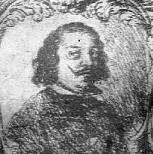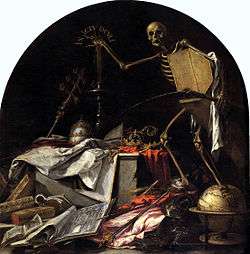Juan de Valdés Leal
| Juan de Valdés Leal | |
|---|---|
 Juan de Valdés Leal | |
| Born |
4 May 1622 Seville |
| Died |
15 October 1690 (aged 68) Seville |
| Nationality | Spanish |
| Known for | Painting, sculpture, architecture |


Juan de Valdés Leal (4 May 1622 – 15 October 1690) was a Spanish painter and etcher of the Baroque era.
Career
Valdés was born in Seville in 1622. He became a painter, sculptor, and architect. By his twenties, he was studying under Antonio del Castillo in Córdoba.
Among his works are History of the Prophet Elias for the church of the Carmelites; Martyrdom of St. Andrew for the church of San Francesco in Córdoba; and Triumph of the Cross for la Caridad in Seville. He became friends with Bartolomé Esteban Murillo, who had a very different style; Leal tended to paint somber and dramatic subjects, while Murillo's style was peaceful and serene. After Leal returned to Seville in 1656, he and Murillo founded the Seville Academy of Art.
Several of his paintings treat the subjects of vanitas, transience and mortality. Two examples are In ictu oculi ("in the blink of an eye") and Finis gloriae mundi ("end of the world's glory"), painted for the Charity Hospital in Seville.
Life
He married Isabella Carasquilla, daughter of Antonio Palomino, in 1647. She was also a painter. He and his wife had five children, several of whom were also artists: Lucas, Juan, Maria, and Laura. His daughters specialized in portrait miniatures. Valdés died in Seville in 1690. His wife died in Seville as late as 1730. Maria died a nun in the Cistercian Convent in Seville in 1730.
References
- Bryan, Michael (1889). Walter Armstrong and Robert Edmund Graves, ed. Dictionary of Painters and Engravers, Biographical and Critical (Volume II L-Z). York St. #4, Covent Garden, London; Original from Fogg Library, Digitized May 18, 2007: George Bell and Sons. p. 604.
- "Juan de Valdés Leal". The J. Paul Getty Museum. Retrieved 2012-07-22.
Further reading
- Darby, Delphine Fitz (June 1962). "Valdés Leal, Spanish Baroque Painter by Elizabeth du Gué Trapier". The Art Bulletin (Book Review). 44 (2): 141–146. JSTOR 3048004.
- Wethey, Harold E. (Winter 1982). "Spanish Painting of the Late Baroque". Art Journal. 42 (4): 331–335. JSTOR 776694.
- Kinkead, Duncan T. (September 1982). "The Altarpiece of the Life of Saint Ambrose by Juan de Valdés Leal". The Art Bulletin. 64 (3): 472–481.
- Kinkead, Duncan (February 1990). "Juan de Valdés Leal by Enrique Valdivieso". The Burlington Magazine (Book Review). 132 (1043): 137. JSTOR 884181.
- Lurie, Ann Tzeutschler (October 1992). "More about Valdés Leal's Sketches for Seville's 'Assumption of the Virgin' and 'Immaculate Conception'". The Bulletin of the Cleveland Museum of Art. 79 (8): 288–303. JSTOR 25161372.
- Brown, Jonathan (19 March 1995). "Spanish Still Life: The High Art of Humble Objects". The New York Times. pp. H 43.
- Hutchinson Encyclopedia of Biography. Helicon. 2000 – via Biography Reference Bank (H.W. Wilson). (Subscription required (help)).
- Columbia Electronic Encyclopedia. Columbia University Press. 2016 – via EBSCO's MasterFILE Complete. (Subscription required (help)).
External links
| Wikimedia Commons has media related to Juan de Valdés Leal. |